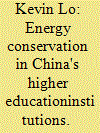|
|
|
Sort Order |
|
|
|
Items / Page
|
|
|
|
|
|
|
| Srl | Item |
| 1 |
ID:
121328


|
|
|
|
|
| Publication |
2013.
|
| Summary/Abstract |
This paper analyzes the energy conservation situation in China's higher education institutions (HEIs). A case study was conducted in Changchun, Jilin, where eight HEIs of various types were examined. An analysis of government policies was also performed. The findings indicate that the HEIs have implemented comprehensive non-technical initiatives to conserve electricity, including electricity restrictions and extensions of winter breaks, as well as certain technical initiatives. The HEIs are less enthusiastic in conserving thermal energy due to a lack of financial incentives and resources. Differences between the HEIs are also noted. This paper discusses the role of key players, including administrators, government agencies, networks, students and non-government organizations (NGOs). Challenges to energy conservation are also identified, such as the lack of investment by schools, lack of government funding, quality problems in energy conservation products, inadequate heat metering reform, underperformance of energy service companies (ESCOs), and conflicts between energy conservation and student welfare. Policy recommendations are offered based on the analysis results.
|
|
|
|
|
|
|
|
|
|
|
|
|
|
|
|
| 2 |
ID:
101484


|
|
|
|
|
| Publication |
2010.
|
| Summary/Abstract |
This paper provides an insight into energy efficiency interventions studies, focusing on issues arising in UK higher education institutions (HEIs) in particular. Based on a review of the context for energy efficiency and carbon reduction programmes in the UK and the trends in higher education sector, existing external and internal policies and initiatives and their relevant issues are extensively discussed. To explore the efficacy of some internal intervention strategies, such as technical, non-technical and management interventions, a survey was conducted among UK higher education institutions between February and April 2008. Consultation responses show that there are a relatively high percentage of institutions (83%) that have embarked on both technical and non-technical initiatives, which is a demonstration to the joined-up approach in such area. Major barriers for intervention studies are also identified, including lack of methodology, non-clarity of energy demand and consumption issues, difficulty in establishing assessment boundaries, problems with regards to indices and their effectiveness and so on. Besides establishing clear targets for carbon reductions within the sector, it is concluded that it is important to develop systems for effectively measuring and evaluating the impact of different policies, regulations and schemes in the future as the first step to explore.
|
|
|
|
|
|
|
|
|
|
|
|
|
|
|
|
|
|
|
|
|